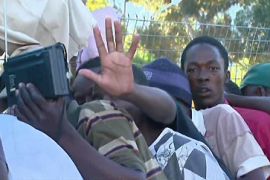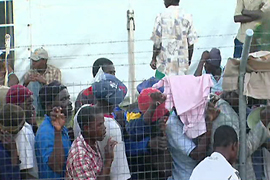Migrant workers at risk in S Africa
At least 2,000 Zimbabweans seek refuge in rugby stadium after their shacks are levelled.

‘Horrific attacks’
Many of those displaced came from a squatter camp and they left after they lost everything, our correspondent reported.
| in depth | |||||||||
|
“Some of the attacks are just so horrific [that] whole houses have been razed to the ground,” she said.
Last year violence unleashed on migrants on the outskirts of Johannesburg, the commercial centre, left at least 62 people dead, forcing the UN refugee agency to move many migrants into relief camps.
Aid groups have dubbed Tuesday’s attacks xenophobia, but government officials say it is a labour matter that local farmers shouldn’t favour one nationality over another.
Manfred van Rooyen, a local official, said migrants from other countries had not been targeted.
“This is not per say xenophobia – we also have other people from Lesotho and other parts of Africa that live in De Doorns and they are not being affected,” he said.
But Andrej Mahecic, a spokesman for the UN refugee agency, said: “This is the first xenophobic attack affecting refugees and asylum seekers in South Africa since the countrywide violence in May 2008.”
No quick fix
Ntombi Mcoyi, of Africa Unite, an organisation that works with migrant communities in Cape Town, said the government was getting “resources of survival” to the people.
 |
| A spate of violence over jobs has displaced at least 2,000 Zimbabwean migrants |
But she said “it is not a situation that can be resolved overnight or in a couple of months”.
“What’s happened is not just about foreign nationals moving to South Africa,” Mcoyi told Al Jazeera.
“But it’s also the need of South Africans that have not been met over the years.”
She said South Africa is still going through a “lot of poverty, high unemployment in the communities”.
“There’s a lot of ill-feeling of South Africans in the local communities of their needs not being met … That’s being transferred as anger to foreign national communities,” Mcoyi said.
“Alot of promises were made to South African people post-1994 [when South Africa held its first ever multi-racial elections].
“People expected to get a lot and gain a lot. This hasn’t happened and now with the influx of foreign people.”
